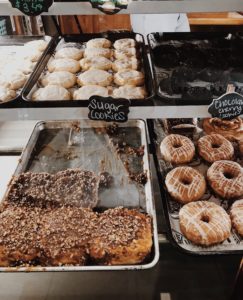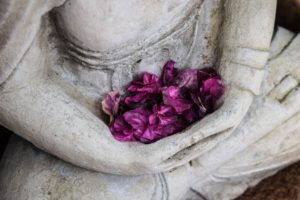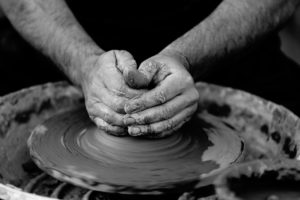by Jenny Rose | Nov 22, 2018 | Aging, Connection & Community, Emotional Intelligence
At 6:30 a.m. on Monday morning, we park in the dark, empty parking lot and use a combination keypad to enter the building and a key to unlock the door to the pool, re-locking it behind us. We turn on lights, computers and automatic doors. We run a shower in the men’s and women’s locker rooms, as the hot water takes several minutes to reach them and the early swimmers complain of cold showers. We check the temperatures and chemicals in the pools. We peel off our winter layers and put on suits, shorts, emergency fanny packs and whistles. We check the day’s schedule. All the while, a rising chorus of voices and laughter comes from outside the still-locked door where the early water aerobics class gathers, as though it’s noon and not O-dark-thirty on a cold November morning. The aerobics teacher gets her music ready and checks the wireless headset. This class is large, so she will teach from the pool deck rather than the water.

Photo by ivan Torres on Unsplash
At 7:00 we unlock the door and they stream in, laughing and talking, tousled heads of grey, white and improbable shades of blonde and brown. Not one of them is under 55. This morning the entire class consists of women. They disappear into the locker room, where the mirth and talk continue as they change and shower. I gather up a rescue tube and get comfortable in the lifeguard chair.
Descending the steps into the pool, the women tease one another and complain about the cold water. Many wear glasses, though they’ve removed their hearing aids. Many wear earrings. A couple of them dispense kickboards, foam buoys and floating foam noodles from plastic laundry baskets on shelves at poolside.
On this morning I count 17 in the class. We know one of them had a birthday over the weekend. The instructor gives her a blue plastic tiara and matching wand from the Dollar Store while we all sing “Happy Birthday.” She’s informed the tiara must stay on her head during the class. She presses it firmly onto her grey hair, laughing.
The instructor cues the music. I jiggle the dial on the wireless speaker, which never seems to work properly, and the class begins with the announcement of a Beatles soundtrack. “Hard Day’s Night” starts the warm-up to a 45-minute water aerobics workout.

Photo by Cristian Newman on Unsplash
Music is so evocative. I can’t hear The Beatles without thinking of my brother, who owned and played all their albums when we were growing up. These women are a decade older than I am, and they greet each song with delight. They know every word. They bob up and down, kicking, twisting, using the kickboards and buoys for resistance and strengthening in the water. Most are generous-bodied and their bosoms bounce within the confines of their modestly cut suits. I see lime green, pink and black. I see loosened skin and wrinkled cleavage, pink scalp and cellulite while “Revolution” fills the brightly lit, echoing space.
The instructor guides the class from one set of movements to another. They stand in place. They travel back and forth across the pool. They lift, bend and stretch in a circle. We all sing together. They inform each other, soulfully, “I want to hold your hand.” The water churns with their efforts. “Got to get you into my life!” they shout at one another with hilarious passion.
As I watch, I try to imagine these well-ripened, glorious women as teenagers. I imagine them hearing “Good Day Sunshine” for the first time on radios, records and jukeboxes in diners, in cars and at parties. They were all young once, pretty, idealistic and probably as foolish as most young women are. They had homework and crushes on teachers. They had families and friends and gossiped. The Beatles were part of the soundtrack of their lives. Now, decades later, what old memories, thoughts and feelings do these familiar songs unlock? What stories do they recall, what pleasures, what griefs and disappointments when they hear “All My Loving?”
The very last song is “Yellow Submarine.” By now even I am breathless with laughter. Impossible to hear this music without moving to it, even if confined in a sitting position. The instructor is incapable with mirth. It doesn’t matter. The class guides itself, arms high in the air over their heads, red-faced, panting, dancing in the water. They turn, bump ample hips with one another, gesture flamboyantly, and we all sing at the top of our voices until the music stops and the class ends.
Knowing the routine, the class puts all the equipment away tidily in the sudden quiet. They pull the lane lines back into place and hook them up. They exit the lap pool and move to the 93-degree therapy pool, where they break into groups and chat, some in the shallow end and others floating peacefully in the deep end. The birthday girl is still wearing her blue plastic tiara. Now the talk is more subdued than it was before the class. I hear a discussion about snow shovels, snow blowers, and the performance of various men, hired and otherwise, with these tools. I hear talk of families, grandchildren and plans for the holidays. A group in a corner carries on a low-voiced discussion interspersed with much bawdy laughter. It’s not hard to imagine what they’re talking about. I smile in sympathy. Local news and politics are dealt with, along with the weather, the state of the roads, church gossip, local holiday activities and fund raisers.
It’s just 8:00 on a Monday morning. These women represent part of the backbone of the community. Seasoned, experienced, humorous and wise in the ways of the world, they know exactly who they are and what they’re made of. They’ve loved and lost, worked, raised families, volunteered, suffered grief, illness and injury. They’re outspoken, earthy and unapologetic. They know how to connect with others. They know how to play and laugh. They are kind and compassionate without being sentimental. They know how to love life.
Monday morning we all lived in a yellow submarine for an hour, and proclaimed it joyfully at the top of our voices.
I wish you all abundance this Thanksgiving.

Photo by Joanna Kosinska on Unsplash
All content on this site ©2018
Jennifer Rose
except where otherwise noted
by Jenny Rose | Nov 15, 2018 | Connection & Community, Emotional Intelligence
 We woke to a snowstorm this morning in central Maine. I could hardly wait to get out in it and walk. It was snowing hard and accumulating fast, coming down in heavy, wet flakes. I headed to work midmorning, maneuvering out of the driveway with some difficulty. The ground was already well saturated before this storm.
We woke to a snowstorm this morning in central Maine. I could hardly wait to get out in it and walk. It was snowing hard and accumulating fast, coming down in heavy, wet flakes. I headed to work midmorning, maneuvering out of the driveway with some difficulty. The ground was already well saturated before this storm.
Getting out of the driveway is the hardest part of winter driving here. I’ve been amazed at how well the roads are taken care of in Maine, much better than the rural roads and streets in Colorado. Still, winter driving is winter driving, and I gave myself plenty of time.
I quickly discovered the paved road was every bit as treacherous and without traction as the driveway. There was a heavy coating of slush and no sign of sanding or plowing. If I went over 30 miles an hour I lost traction and I almost couldn’t climb the steepest hill on the way into town. I turned on my audiobook, sipped my travel mug of tea, and settled down for a slow and careful commute, wondering why the road crews seemed to be ignoring the dangerous conditions.
 I started down a gently sloping hill with a shallow curve. One minute I was driving and the next I was floating. I was alone on the road. Nothing happened. I hadn’t accelerated or braked or jerked the wheel. I just started slipping across a thin layer of slush between the tires and the pavement, and I knew I wasn’t going to make the curve. I kept my feet off the pedals and tried to steer into the skid, but the tires might as well have been glass slippers, for all the traction they had.
I started down a gently sloping hill with a shallow curve. One minute I was driving and the next I was floating. I was alone on the road. Nothing happened. I hadn’t accelerated or braked or jerked the wheel. I just started slipping across a thin layer of slush between the tires and the pavement, and I knew I wasn’t going to make the curve. I kept my feet off the pedals and tried to steer into the skid, but the tires might as well have been glass slippers, for all the traction they had.
I was very lucky. The side of the road was thickly edged with woody shrubs like alder and willow. I didn’t hit a pole, tree or fence, and I wasn’t going fast. I also didn’t land in water, a real danger here in Maine. I recognized the weightless feeling in the pit of my stomach and knew I was helpless, a victim of momentum. All I could do was sit tight and wait for the car to stop. I wasn’t at all scared. I had a seatbelt on and I was only coasting.
I’m going to be late for work, I thought, resigned.
The brush and bushes caught me neatly. I turned off the audiobook and engine, turned on the hazard lights, gathered up my keys, wallet and travel mug of tea — not a drop had spilled — and set out for the nearest house.
I was greeted by the baying of several dogs, the alarm calls of a pair of geese and a woman about my own age with very blue eyes. I explained, said I didn’t have a cell phone, and asked if I could call for help.
She was extremely kind. The dogs were contained somewhere while I waited. The geese eyed me balefully. When I stepped inside, the house was warm and a stove glowing. It was a typical farmhouse kitchen, cluttered, friendly, comfortable, filled with plants. She handed me her cell phone, introduced herself as Sarah, and asked if I was hurt. I reassured her I was perfectly unharmed, called my partner and called work. I was about to call AAA when she offered to pull me out with her tractor.
I dithered. I have a horror of being a burden or needing help. Why should this woman leave her cozy kitchen and go out into the snow and slush to pull a stranger out of the ditch? She told me to stop apologizing and pointed out that AAA would likely take a long time to respond, given the local conditions. We both wore heavy mud/snow/rain boots. She flung on an old yellow slicker and fired up the tractor.
The tractor couldn’t get any traction, either. It churned up mounds of mud and grass, but the chain wasn’t long enough to allow it to pull from the pavement, and she came close to sliding sideways into the ditch, just as I had done.
At this point we’d both been lying on the slushy, muddy ground hooking up chains, the snow was coming down in wet clots, and the narrow rural road we were on was extremely hazardous. Sarah took the tractor back and returned with “Tank.” Tank is an old-fashioned heavy farm truck, painted in camo and looking indestructible.
Tank couldn’t pull me out, either.
 During all this, everyone who went by stopped to ask if we needed help.
During all this, everyone who went by stopped to ask if we needed help.
The snow turned to heavy rain.
We went back to the house and I called AAA.
I wanted to wait for the tow truck in the car, but Sarah wouldn’t hear of it. We could see the car from her kitchen window. We were both wet and muddy to the skin. We sat at the kitchen table and talked about our sons (her two and my two) and what we’d done with our lives so far. Every car that went by mine either slowed or stopped. We were so worried someone else would go off the road or my mishap would cause another accident, we put a note on the car window saying Nobody hurt. Waiting for tow truck.
About an hour later a big tow truck pulled up. I thanked Sarah from the bottom of my heart, put my sodden coat back on and went out into the pouring rain. There were two young guys in the truck. They considered the problem, walking around the car in their heavy boots and the bulky waterproof gear all the working men seem to wear here. They decided the only way to get me out was to pull me sideways back onto the road. I was shivering by that time. I got in the driver’s seat, rolled down the window (I could hardly have been wetter), and prepared to follow directions.
While they were working the road was effectively blocked. A big pickup truck came along, pulled into the center of the road behind the tow truck, and turned on his hazards.
They pulled this way and that. I went from neutral to park and back again. I braked when they told me to. The rain ran down my face and neck and under my coat and other clothing. Branches scraped across the car. The winch whined. Mud and slush churned. A few vehicles waited patiently. We finally got two tires on the road. They got behind me and told me to accelerate nice and slow. I did so, they pushed, and the tires found the pavement again.
I thanked them wholeheartedly. I waved to the kind and patient human being who blocked traffic and kept us all safe.
This morning in Maine there have been many, many accidents, including a flipped-over school bus, snowplows off the road, jackknifed trucks and people like me sliding into ditches, power poles and other cars. There have been cancellations, delays and detours. We are warned of flooding. This afternoon and tonight we expect freezing rain. The storm is not over, but my adventures for the day are. I crept back home three hours after I left it, shivering, wet and exhausted, and promptly got stuck in the driveway.
How do we thank the strangers who brush against our lives and lend a helping hand? I’ve never known. A simple thank you seems so wholly inadequate. Still, what else can I say? What about all those anonymous strangers who help in ways we never know about, or come and go so quickly we don’t even see their faces? As an old first responder, I know how essential traffic control is, but I don’t know if the driver who shielded us and stopped traffic was a man or woman. I suspect everyone’s plans were disrupted this morning, but people slowed and stopped to make sure the driver of the car in the ditch was not injured or needing help. Treacherous roads, blinding snow and then rain, a dark November day, and ordinary men and women willing to assist in spite of it, willing to leave their warm firesides and kitchens, willing to climb out of their dry, cozy vehicles, willing to do what they could for a stranger.
These are the darkest times I’ve seen in America in my lifetime, but this morning my faith in humanity was renewed. A series of strangers helped me when I was in need, and because of them I’m back home, safe, dry and warm. I’m grateful. I also know that all over the world people are practicing small acts of kindness all the time, ordinary people going about their business in neighborhoods, communities and at work. This post is for them.
Thank you for checking to make sure a stranded driver is okay. Thank you for answering a stranger’s knock at your door. Thank you for offering a cell phone or other means of communication to someone who is stuck without the ability to call for help. Thank you for helping direct or block traffic so further accidents don’t occur. Thank you for being patient when an accident holds you up. Thank you to all those first responders, tow truck drivers, utility company workers and the other hundreds of thousands who are there with tow chains, chainsaws, shovels and tractors when the unexpected happens. You might be doing your job, but thank you anyway for your smiles, your kindness, your expertise, your willingness to contribute, your difficult and often risky work, and your humanity.
My hope lies in all of us who do what we can in our little corner of the world. The simple, humble kindness of strangers may, in the end, save us.

Photo by David Monje on Unsplash
All content on this site ©2018
Jennifer Rose
except where otherwise noted
by Jenny Rose | Nov 1, 2018 | Connection & Community, Emotional Intelligence
What does it mean to make a home? I wonder if it means something different to everyone, or if we have a common vision.
All my adult life homemaking has been a top priority, not so much for myself, but for others. Creating home has been my labor of love and one of my greatest contributions to relationship. Few things give me as much satisfaction as establishing a place of peace, beauty, security and clean, well-ordered efficiency in which to relax, play, share life and be intimate. In the past I didn’t count the cost in emotional labor, physical labor, time or energy. I didn’t expect reciprocity. I only wanted to be allowed to make the offering of a home.
It never occurred to me the enormous gift of creating a home would be largely invisible and mostly unappreciated.
My disillusionment was gradual. I realized one day cleaning the bathroom meant nothing to those I was sharing it with. It gave me a lot of satisfaction, but was rarely even noticed by others. That was the first time I grasped I wasn’t going to get thanked or validated for cleaning. If I wanted to clean, I needed to make sure I was doing it for myself and have no expectations that anyone else would pay attention.
I was on my own with the cleaning thing.
I was also on my own in evaluating a new home for ease of maintenance and housekeeping as well as suitability for pets and kids. I was the one who thought about clotheslines and their proximity to laundry facilities; flooring in entryways, bathrooms and kitchens; and outside and inside wood storage for the woodstove. I was the one who thought about how to deal with trash and recycling and where to put the litter box and store the dog food.
Not every woman is a natural homemaker. I think many perform as such because nobody else will and the culture expects it of them. I’ve always loved that kind of work, even knowing it’s unpaid and undervalued in the larger world. I assumed, in my innocence, that homemaking was an investment in a healthy and happy family, and that was the only payback I needed.

Photo by Mar Newhall on Unsplash
The thing about being young is we can’t imagine how decades of unappreciated and invisible work and support grind us down and polish a thick shell of cynicism. It turns out I did want some degree of appreciation and acknowledgement from my family for making a home. I couldn’t pull off the perfect wife/mother/housekeeping role with a clean white apron and endlessly abundant nurture, energy, patience, organization and efficiency with no return. I especially couldn’t do it while working outside the home, going to school and single parenting.
Fulfilling cultural expectations turned out not to be very fulfilling, after all.
 Eventually I found myself alone. Children grown and gone, a file folder labeled ‘Divorce’, and freedom to make a home solely for myself at last. Complete and total control. Bliss! I had a wonderful time giving myself exactly the kind of home I’d always dreamed of. All my efforts were on my own behalf. I didn’t care what anyone else thought and I didn’t need anyone to appreciate the home I made for myself. Housekeeping was uncomplicated, easy and filled with joy.
Eventually I found myself alone. Children grown and gone, a file folder labeled ‘Divorce’, and freedom to make a home solely for myself at last. Complete and total control. Bliss! I had a wonderful time giving myself exactly the kind of home I’d always dreamed of. All my efforts were on my own behalf. I didn’t care what anyone else thought and I didn’t need anyone to appreciate the home I made for myself. Housekeeping was uncomplicated, easy and filled with joy.
I concluded homemaking wasn’t, after all, a gift, a talent or an adequate offering. It didn’t translate as a declaration of love, support and commitment. My loved ones didn’t value my contribution. It was a meaningless use of my time and energy and put me in the vulnerable position of looking for validation and appreciation from others.
I felt like a fool, and it made me bitter. I promised myself never again would I try to make a home for anyone but myself.
I never imagined, even as a teenager, anyone would make a home for me. I wasn’t that naïve!

Photo by Vanessa von Wieding on Unsplash
Here in the tarnished and somber season of late fall and lengthening nights an amazing thing has happened.
I noticed it when I began coming home in the dark after work. My partner leaves lights on for me so I can easily negotiate backing into the driveway and navigate the steep cellar stairs. When I open the door at the top of the steps and enter the kitchen, the dishes are done. The house is warm and the wood stove glowing in the living room. The cat is fed. The kitchen smells of beef stew, chicken soup or baking.
Home. My home, but this time not created solely by me for someone else. This home is a collaboration, and it’s incomplete without me. I’m not invisible. My presence has worth. After all these years, all the meals and baking, all the housework and candles and welcoming lights in windows, the clean clothes, the fresh beds, the cared-for animals, the countless cords of wood for various stoves, all that invisible and unnoticed love, I’m reaping a late harvest.
Someone makes a home for me now, and waits for me to return, not to maintain it but to be part of it.
At the end of my workday, I’m actually at the end of my workday. I don’t have to unload the car, fumble my way into a dark house, turn on lights, get the woodstove going, make a meal, take care of pets and/or kids and/or adults, shut curtains and lock doors. My partner doesn’t meet me at the door with roses, wine and sweet talk. He gives me far more enduring and authentic gifts of a place and relationship to come home to. I discover those offerings are every bit as worthy as I imagined when I was a newly-married 21-year-old. All my work over the years was real. It was valuable. It was loving and important. It was a beautiful contribution. The fact that no one noticed or appreciated the home I made for them did not, after all, define the value of my intention.
I suppose it’s just one of life’s little ironies that now, at this late date when I’ve completely given up expectations and fantasies that others will perceive homemaking as an expression of love worthy of acknowledgement, someone in my life finally gives back to me what I’ve given in such abundance to others.
It’s a late harvest, but well worth the wait.

Photo by Craig Whitehead on Unsplash
All content on this site ©2018
Jennifer Rose
except where otherwise noted
by Jenny Rose | Oct 18, 2018 | Connection & Community, Emotional Intelligence, Shadows
 I first heard about toxic mimics as I learned emotional intelligence. The term comes from radical environmentalist author and speaker Derrick Jensen. A toxic mimic is a destructive action, behavior or thing pretending to fill a primary human need. Rape is a toxic mimic for healthy, consensual sex. Sugar is a toxic mimic for food. Addiction is a toxic mimic for managing feelings. A job might be a toxic mimic for contribution. Pseudo self is a toxic mimic for authenticity. Some would argue that social media is a toxic mimic for connection.
I first heard about toxic mimics as I learned emotional intelligence. The term comes from radical environmentalist author and speaker Derrick Jensen. A toxic mimic is a destructive action, behavior or thing pretending to fill a primary human need. Rape is a toxic mimic for healthy, consensual sex. Sugar is a toxic mimic for food. Addiction is a toxic mimic for managing feelings. A job might be a toxic mimic for contribution. Pseudo self is a toxic mimic for authenticity. Some would argue that social media is a toxic mimic for connection.
I believe our modern culture here in the United States, at this moment, rests on an edifice of toxic mimics. People who create, design and sell toxic mimics have a simple agenda: Profit and power. We, the consumers and choice makers, the common people, if you will, happily hand over our power in exchange for the shiny; the new and improved; the seductive promise of success, wealth and love; and the popular. Toxic mimics give us the relief of distraction, instant gratification and the promise of an identity. They help us regulate our mood and feelings.
Toxic mimics have such power over us now that a majority of us (maybe) have voluntarily given management of our country to toxic mimics for human beings.

Photo by Patrick Brinksma on Unsplash
What are the strongest human motivators? Fear? Love? Hate? I could also make a case for denial, but that might be too inextricably bound up with fear to separate. Toxic mimics are deliberately designed and marketed to appeal to the things that drive us at our deepest levels. They are engineered to target our greatest vulnerabilities. They seek to hook us, permanently, helplessly and hopelessly, and they’re so powerful they kill many, many people. Witness the power of nicotine, for example. Toxic mimics promise to fill our lives with everything we want and provide us an identity, but when we employ them we feel emptier than ever. Because we are conditioned to believe buying a product or service will make us feel better, we buy as much as we can as fast as we can, which necessitates a continuous stream of money, a resource that has become one of the most powerful Gods we’ve ever worshipped. Money, one might say, is a toxic mimic for God, or Gods, or whatever word you like to use to communicate the divine.
The deepest irony in this situation is we are the ones who perpetuate the power of toxic mimics. We willfully and intentionally participate. We create demand and gobble up supply. We continue to support advertising, algorithms and the handful of powerful companies who monitor our lives and mine us for information in order to sell us yet more toxic mimics. We applaud and admire what we call “progress”, “growth” and a “healthy economy.”

Photo by Ev on Unsplash
A healthy economy. Healthy for who, I wonder. Healthy for the global system? Healthy for those of us living paycheck to paycheck? Healthy for the children who are victims (yes, I mean victims) of anti-vaxxers? Healthy for people who have no financial resource and thus cannot participate in the latest technology? In a country filled with disbonded children and broken families; rising antibiotic-resistant organisms, including STDs; rising illnesses like typhus which are perfectly preventable with vaccination; astronomical housing costs forcing employed professionals to live out of their cars; broken healthcare and public education systems and a population of obese, metabolically disordered, pharma-dependent, addicted, lonely, suicidal people, we have a so-called healthy economy.
Oh, good. I’m so proud to be an American.
It’s a lie. There’s nothing healthy about what’s happening now, but we’re so stupefied, so numbed, so habituated, that we no longer recognize lies when we hear them. We can’t afford to, because to recognize one means to recognize others, and if the whole thing is based on lies, we’re too afraid to know it. Much easier to cash the insurance check and rebuild, for the third or fourth time, in the same place than take responsibility for facing the effects, long predicted, of climate change.
Of course, insurance companies are not going to continue to subsidize climate change because it destroys their profits, so that might catch our attention — eventually.
 In the meantime, we bend our heads over our handheld, shiny, talking, distracting and instantly gratifying techno-screens or settle down in front of our larger screens and surround sound systems and let the advertising and brainwashing wash over us. We call this life. Isn’t it grand? Isn’t it beautiful? Aren’t you happy?
In the meantime, we bend our heads over our handheld, shiny, talking, distracting and instantly gratifying techno-screens or settle down in front of our larger screens and surround sound systems and let the advertising and brainwashing wash over us. We call this life. Isn’t it grand? Isn’t it beautiful? Aren’t you happy?
A toxic mimic is a promise that never delivers. Sometimes we do it to ourselves. Sometimes we allow others to convince us of the necessity, morality and rightness of our toxic mimics. We’re told they will make us safe. They will make us successful. They will make us healthy and popular, beautiful and beloved. We’re told we have a perfect right to have what we want. We long to believe it. We buy, and then we don’t feel successful or beautiful, so we buy some more. We start giving away our power. We begin to hide our unhappiness. After all, toxic mimics are working for everybody else, aren’t they? Everyone on our favorite social media platform is doing just fine. We conclude there’s something wrong, broken and irredeemably ugly about us. It’s too shameful to admit or talk about. We take even more smiling selfies and post them.
Meanwhile, we elevate and empower not the humanitarians, the natural leaders, the ecologists, the visionary scientists, the emotionally intelligent, the critical thinkers and those who understand complexity and systems, but those who have wealth. Money, that amoral symbol made of paper and metal, is the God we’ve agreed is the most powerful and the most admirable. It’s not so, of course, but we make it so with our belief and our participation. We are driven by our fear of losing economically. We’re evidently prepared to follow the promise of economic power straight to Hell.
Fear is the most powerful hallmark of a toxic mimic. Fear of losing power. Fear of being wrong. Fear of consequences, justice and having to take responsibility. Fear of experiencing our feelings. Fear makes our lives, intellect and hearts smaller, not larger. Toxic mimics don’t meet our needs. They momentarily satisfy, perhaps, our cravings and addictions, our need for stimulation and gratification and our desire for distraction. Ultimately, however, toxic mimics dehumanize us, stop our critical thinking, retard our judgement, destroy our health, disable us from healthy connections and encourage us to hide our authenticity. Toxic mimics feed our rigidity, our ideology, our fear and paranoia, and actively attack our physical and mental health.
Are your needs being met? If you don’t know what your needs are, here’s a needs inventory to look at.
If that question made you cry, or your heart shouted “NO!”, make a list of all your makeup, your clothes, your car(s), your tech, your toys and the other stuff you recognize as part of your identity. Don’t forget your accounts, subscriptions and financial assets.
All that, and your needs are not being met?
Huh. Interesting, isn’t it?
All content on this site ©2018
Jennifer Rose
except where otherwise noted
by Jenny Rose | Oct 11, 2018 | Contribution, Emotional Intelligence
When I went through emotional intelligence training, I learned about three basic human needs: Contribution, connection and authenticity. If these primary needs are not adequately met, our lives don’t work well. I’ve written about my wary relationship with my own needs before. As I explore emotional intelligence, I’m struck by the simplicity of the three basic needs, the paradoxical complexity of each one, and the unique ways, often unconsciously, we each approach getting these needs met. I also notice the way these needs are inextricably woven into each other.
In these first couple of weeks of a new job, it’s been necessary to build a new schedule, which felt overwhelming until I remembered the three basic needs. I’m a creature of habit and I quickly stop assessing how I spend my time once I have a workable schedule. I engage with activities I’m accustomed to engage with and that’s that.

Photo by John Salvino on Unsplash
When I trained as a medical transcriptionist and started working from home, I was motivated by the necessity of earning a living and managing my then-teenage sons as a single mother. Medical transcription was a perfect solution. Gradually, without me really noticing, I allowed the job to become a prison. The boys grew up and moved out. I was promoted twice, but never earned a comfortable living. The job came with intense pressure that triggered my stress and perfectionism. It was isolating. It was difficult physically and keyboarding began to give me overuse injury.
I depended on my inadequate paycheck. It was the only income I had.
I was stuck.
I was aware during the last couple of years I worked as a transcriptionist that the job was no longer meeting any of my needs, aside from the paycheck, but a paycheck is kind of essential. In fact, in my mind it was the essential priority in my life, and I labored away in spite of migraine headaches and increasing pain in my upper extremities and shoulders until the day came when I could no longer keyboard without sobbing and I developed a frozen shoulder. I couldn’t take off my shirt without feeling faint from pain.

Photo by freddie marriage on Unsplash
The hardest thing about that job was not the poor pay, but feeling my contribution didn’t matter. The medical professionals were dictating into a piece of equipment and rarely, if ever, considered the human being trying to transcribe their dictation, unless it was to complain and criticize errors. The company I worked for is a huge global conglomerate on the cutting edge of speech recognition technology and a whole host of other businesses. I was nameless and faceless. All training and in-services were done remotely. Management had a high turnover. Changes happened without notice, like getting transferred to a new book of business. Overtime, when needed, was mandatory. Transcriptionists were expected to work 24/7 and weekend shifts were required.
Many people can type quickly and accurately. It’s mostly a matter of practice. I was a pair of hands and ears racing the clock, along with hundreds of others like me, both here and overseas. The job wanted no authenticity from me or anyone else. It’s a job for robots.

Photo by Edu Lauton on Unsplash
I am not a robot.
I’ve been seeking a new job because I want to start earning income again, but this time I promised myself I wouldn’t take a job that didn’t feel meaningful to me, and I knew exactly what I meant by meaningful. A meaningful job is not about the paycheck. Yes, obviously, I need money in today’s world. Not a lot, but some. Enough to justify my time, travel and commitment. However, the work I do in exchange for a paycheck of any size is only meaningful if it makes a positive difference in the lives of others. I don’t want to be paid for being a robot impersonator. I want to be paid because I contribute something wanted or needed out of my own authenticity.
Working as a member of a team in order to keep people safe, assist patients in rehabilitation, and teaching swimming feels meaningful and allows me to work from the heart. In my little corner of the world I can be part of something healthy and healing for myself and others.
As an ex-people-pleaser, I endeavored for most of my life to make a positive difference in the lives of my family and immediate connections. I worked as hard as I could at it, and making a meaningful contribution was my top priority. In spite of all my efforts, I failed. In fact, it seemed the harder I tried the more obnoxious I was to those around me. Naturally, I concluded that I was nothing. I had nothing to offer that anyone wanted. It would be better for everyone if I disappeared and relieved them of the burden of my presence.
Two important things I’ve learned from those years are people pleasing doesn’t work, and some people are determined never to be pleased. I learned to define for myself what a “good” job is. I began to seek paid work I enjoyed as much as volunteer work and kept my focus on the feeling of making a positive contribution.

Photo by Cristian Newman on Unsplash
I see and hear a lot of discussion about the increasing problems of loneliness and depression, and I suspect many of those affected feel unable to make a meaningful, authentic contribution in their families and/or communities. Somewhere along the way we decided a paycheck is more important than the quality of our contribution, but ultimately, as human beings, no paycheck is an adequate substitute for feeling our contribution matters. Our culture does not necessarily reward authentic contribution. We like our infallible robots and good soldiers, those who do and say exactly what they’re programmed to do and say. Loose cannons like me are a problem nobody wants in the classroom or the boardroom.
I’m sorry I believed for so long I had nothing to contribute. It made me miserable and was the root of many destructive choices. Now I believe we all have a great deal to offer, and someone out there needs exactly what we can contribute. What would the world be like if every man, woman and child truly felt they had something unique to give that made a positive difference in just one other life? What if contributing and receiving contributions were not tied to money? What if we all woke up in the morning knowing the world is a better place because of our presence?
What would it take to make that a reality for everyone?
I’m fortunate to have found a way to make an authentic, meaningful contribution combined with a paycheck. Not everyone is able to do that. But everyone is able to do something. Plant a tree. Walk dogs living in animal shelters. Visit hospital patients. Assist in schools, day care facilities or retirement homes. Volunteer to answer a hotline. Buy a cup of coffee for a homeless person. Teach literacy.
Someone out there needs what we can give. Someone is waiting for us. All we have to do is go find them.

Photo by Chris Ensey on Unsplash
All content on this site ©2018
Jennifer Rose
except where otherwise noted
by Jenny Rose | Aug 23, 2018 | Authenticity, Emotional Intelligence
Identity is everywhere. Identity theft, identity politics, job applications, and social media profiles confront us at every turn. We are constantly being commanded to prove our identity, not only formally, as in logging on to our bank accounts, but socially, in order to justify our existence, our beliefs and our values.
Technology has created new challenges in the way we talk about, understand and shape our identity. AI is no longer a piece of science fiction, and evidence grows regarding websites, social media trolls and other online entities that successfully manipulate, divide and interfere with social discourse, information and opinion.
We are woefully easy targets.

Photo by Roderico Y. Díaz on Unsplash
Merriam-Webster online defines identity as “sameness in all that constitutes the objective reality of a thing; the distinguishing character or personality of an individual.” The online Free Dictionary says identity is “the set of characteristics by which a person or thing is definitively recognizable or known; the awareness that an individual or group has of being a distinct, persisting entity.”
Objective reality. The term objective means “(of a person or their judgment) not influenced by personal feelings or opinions in considering and representing facts.” (Oxford Dictionary; emphasis mine.) This means a purple-polka-dotted snake cannot claim the identity of a green-striped zebra, no matter how indignantly and vociferously it insists it feels like one. Personality disorders are recognized as such because those who suffer from them are not always dealing with objective reality. A purple-polka-dotted snake who wants to be a green-striped zebra is divided tragically from itself and others, not only other purple-polka-dotted snakes, but all others, because it persists in trying to behave and be accepted as something it’s not, ultimately self-destructing.

Photo by Quino Al on Unsplash”
I’ve written before about labels, denial, arguing with what is and pseudo self, all of which ideas intersect with identity. Have you watched a potter at work with clay on a wheel? As they shape a vessel, one hand works inside and one outside. Identity is like that. The tribe we’re born into gives us our earliest sense of identity, and we take our cues from them. If our tribe is critical and we feel unaccepted and unloved, we internalize those voices and viewpoints and give them power in our psyche to mold our identity. At the same time, we go out into the world and our schools, jobs, communities, places of worship and other organizations identify us from the outside.
Years ago I worked with a group of gifted and talented middle and high school students as a school librarian. None of them fit in terribly well with their classmates. A young man I was very fond of was quite lonely, as well as being brilliant, and he said one day he was nothing but the “fat boy.” He was sixteen years old, and seemed resigned to carrying the identity of “fat boy” to the end of his life. I told him, entirely sincerely, that I never thought of him as the “fat boy.” He was obese. Obviously, I noticed. But to me he was a funny, interesting, curious, compassionate, vulnerable human being. His weight concerned me because of the social stigma and quality of his health, but I never thought of him as the “fat boy.”
He could see that I was telling him the truth. I haven’t any idea what happened to him or what he’s been doing all these years, but I’ve always hoped he remembered there was an adult in his life who saw beyond the limitations of “fat boy” and recognized other pieces of his identity and potential. I hope he learned at some point that he didn’t have to settle for a life defined by his weight.

Photo by Edu Lauton on Unsplash
Over the years of my lifetime, more and more people seem to never mature past teenage identity. We build websites, profiles and a social media presence, desperately trying to sell a successful identity for attention, true love, power or money. We are so compulsive about taking selfies that we die doing it. There’s an explosion of people seeking plastic surgery in order to match their digitally-altered pictures. We have the technology to alter hair color, eye color and physical characteristics, and we’re saturated with digitally-altered images on media that keep us firmly convinced we’re unattractive and imperfect as we are. At the same time, we socially reinforce and perpetuate ridiculous gender, racial and ethnic roles, limitations and expectations.
Perfect strangers insist on imposing labels on us, or try to bully us into choosing one label over another. It’s an either-or black-and-white world, and new labels proliferate like maggots in road kill, creating ever-increasing lines of division and arenas for conflict.

Photo by Chris Barbalis on Unsplash
We are in such a hurry, we’re so overstimulated and anxious to not be left behind and to be validated, we’ve forgotten the simplicity of identity, and we’ve forgotten we don’t owe the world a public explanation or justification of our identity. Having a Facebook or Tinder profile does not constitute an identity. Having feelings and opinions about who we are is not an identity. Our carefully constructed pseudo self is not an identity. Our identity is not maintained and created by what others think, feel or say about us. Identity is not an endpoint, but a journey. Healthy identity is flexible. It adapts and changes as we live our lives. We are not who we wish we were, who we are afraid we are or necessarily who we think we are. We are not exactly who we were yesterday or who we’ll be tomorrow. We’re certainly not necessarily what others tell us we are, or must be, although objective reality always trumps our internal fantasies.
Our identity, like our power, is ours alone. We need not sell it or give it away, and it cannot be stolen from us. On the other hand, we must take responsibility for our own self-sabotage and mental disorders if we seek a healthy identity.
Healthy identity is complex and multi-dimensional. I’ve been daughter, sister, wife and mother, and I’m much more than any of those single roles. I’ve worked several jobs over my lifetime, but I’m more than any of those jobs. I have a physical identity in terms of vital statistics, Caucasian skin, blue eyes and female biology, but none of those markers identify me as completely as the fact that I’m a human being. A healthy identity also accommodates shadows, scars, less-than-useful coping mechanisms and behavior patterns.
My wish simply is to live my life as fully as I can. In both our work and our leisure, I think, we should be so employed. And in our time this means that we must save ourselves from the products that we are asked to buy in order, ultimately, to replace ourselves.”
Wendell Berry, The Art of the Commonplace: The Agrarian Essays
Tech allows us to create superficial fantasies of bright colors and pleasurable images, but those worlds are empty and brittle, like an enticing piece of candy that melts in a minute on our tongue and leaves nothing but the taste of sugar and artificial flavor. We cannot judge identity by houses, gardens, cars, vacations, pets, children, selfies, clothing, jobs or partners. Our possessions, our pictures and our memorabilia are not our identity. Somewhere, under all that stuff, behind all those pictures of success and happiness, apart from our fear and unwillingness to come to terms with our objective reality and our denial, lies the powerful, complex, fascinating, valuable person we really are, and that person longs to be identified and welcomed into life. That person longs to give and receive love, make a valued contribution and live authentically.
I’m interested in the way people self-define and introduce themselves. It always points to either what we ourselves feel is the largest part of our identity or what we think others will value or connect with most readily. This is what lies beneath every dating profile. What do we imagine prospective partners will be most attracted to? What’s the perfect thing to say which will limit unwanted matches and encourage those we imagine might provide whatever we’re looking for? How can we optimize the algorithm and make it work for us?
Sometimes I walk away from meeting a new person feeling overwhelmed and deafened by all the ways they labeled themselves but with no sense of the real human being I just interacted with. Instead of an easy, exploratory, getting-to-know-one-another conversation, I was bludgeoned with political jargon and identifiers, patronized and gratuitously instructed out of some kind of claimed expertise. It feels aggressive, weak and demanding. This is who I am and you will recognize my status, authority and identity! If you don’t apply one of my proud labels to yourself, you should. All the best people do. In any event, my labels are better than yours.
Our identity is not for others, but for ourselves. We’re the ones who need to know who we are, experience our feelings and monitor our thoughts. We’re the ones in charge of our dignity, our sexuality and our choices. We’re the ones responsible for our own integrity. As my hair greys and my fertility wanes, I become more and more physically invisible in the world. At the same time, I’ve never been as strong, as resilient, as wise and as compassionate as I am now. I’ve never loved so well. I’ve never felt so whole or comfortable in my own skin. I have no social media accounts and no cell phone. I don’t use any kind of apps, dating or otherwise. My identity is strong and dynamic, and it’s not for sale or on display. In fact, I’ve always felt being invisible is a great advantage. People who attract no attention are invariably underestimated and overlooked, especially aging female people.
At the end of the day, a life well lived is about being who we are, objective reality included, because everyone else is taken. Fantasy is fun, but real life is where all the juice is.
My daily crime.
“I look like vanilla pudding so nobody knows that on the inside I am spider soup.”
Andrea Portes, Anatomy of a Misfit

Photo by Cristian Newman on Unsplash
All content on this site ©2018
Jennifer Rose
except where otherwise noted























